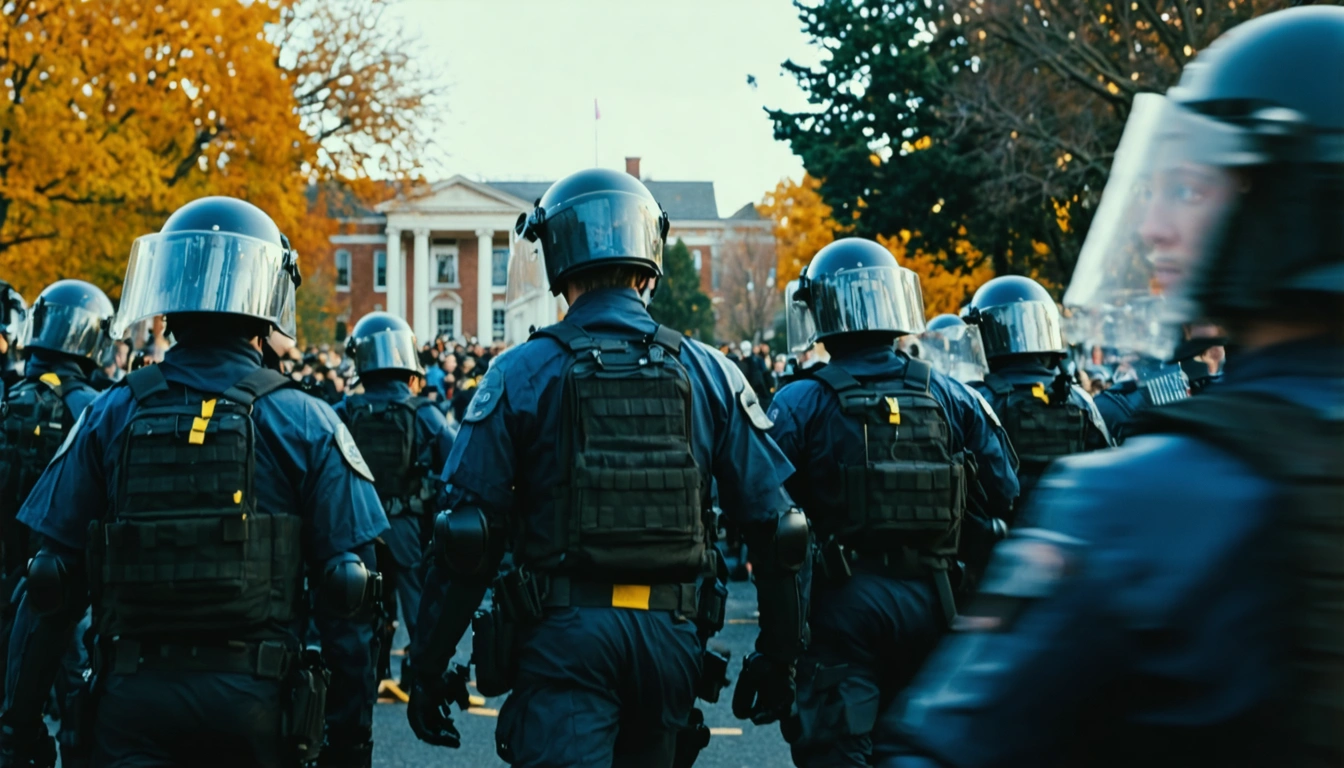When Watching a Documentary Leads to Riot Police: The Erosion of Free Expression on Campus

Imagine gathering with fellow students to watch a documentary on campus—a routine activity in academic life. Now, picture this peaceful event being disrupted by riot police in full gear, leading to arrests and heightened tensions. This scenario isn't hypothetical; it's a reality that has unfolded on multiple campuses, raising serious concerns about the state of free expression in educational institutions.
In May 2025, at the University of California, Los Angeles (UCLA), students organized a screening of "The Encampments," a documentary chronicling student-led protests against military actions in Gaza. The event, intended as a peaceful gathering, was met with a heavy police presence. Officers in riot gear intervened, seizing equipment and arresting three students under the university's "Time, Place and Manner" policy, which regulates campus events. This incident occurred on the anniversary of a previous attack on a pro-Palestinian encampment, where counter-protesters assaulted students while law enforcement stood by. Source
Such interventions aren't isolated to UCLA. In January 2023, at Jamia Millia Islamia University in New Delhi, students planned to screen a BBC documentary about Prime Minister Narendra Modi's tenure during the 2002 Gujarat riots. The university administration, citing unauthorized gatherings, called in riot police. More than a dozen students were detained, and classes were suspended, effectively preventing the screening. Source
Similarly, in April 2024, Pomona College in California witnessed a peaceful sit-in by students demanding divestment from certain investments. The college responded by summoning over 30 police officers, including those in riot gear armed with crowd-control weapons. Nineteen students were arrested, and those from Pomona were placed on interim suspension, losing access to housing and campus facilities. Source
These incidents highlight a disturbing pattern: the deployment of law enforcement to suppress peaceful student activities, particularly those involving politically sensitive topics. The core issue at stake is the balance between maintaining campus order and upholding the fundamental right to free expression. When universities resort to heavy-handed measures, it not only stifles open discourse but also sets a precedent that may deter future activism and critical engagement.
For students, these actions can be disheartening. Campuses are traditionally spaces for exploration, debate, and the challenging of ideas. The presence of riot police at peaceful events sends a message that certain viewpoints are unwelcome, potentially leading to self-censorship and a chilling effect on free speech.
Administrations often justify such interventions by citing safety concerns or policy violations. However, the proportionality of the response is questionable. Deploying riot police to manage non-violent gatherings appears excessive and may escalate tensions rather than defuse them. It also raises questions about the criteria used to determine when law enforcement is necessary and whether these standards are applied consistently.
Moreover, these actions can erode trust between students and university officials. When students feel that their rights are being infringed upon, it fosters an environment of suspicion and resentment. Open communication and transparent policies are essential to rebuild this trust and ensure that campuses remain places where diverse ideas can be expressed and debated freely.
It's also important to consider the broader societal implications. Universities play a crucial role in shaping future leaders and citizens. Suppressing free expression in these settings can have a ripple effect, leading to a society less tolerant of dissent and less equipped to handle complex, controversial issues through dialogue and debate.
In conclusion, the use of riot police to disrupt peaceful campus events is a troubling trend that threatens the foundational principles of academic freedom and free expression. Universities must reassess their approaches to handling student activism, ensuring that safety measures do not infringe upon civil liberties. By fostering an environment that encourages open discourse and respects diverse viewpoints, educational institutions can uphold their mission to educate and empower students to engage thoughtfully with the world around them.
Generational Perspectives
Explore how different generations perceive this topic. Click on a generation to expand.
The Impact on Students and Institutions
Students, particularly those engaged in activism, feel directly threatened by these interventions, perceiving them as attacks on their rights to free expression and assembly. Universities, while aiming to maintain order, risk losing credibility and trust among their student bodies. This dynamic prompts critical reflection on the balance between security measures and the preservation of academic freedom.
Finding Common Ground
Despite generational differences, there is a common understanding of the importance of free expression and the need to protect civil liberties. Recognizing this shared value can serve as a foundation for intergenerational dialogue and collective action to uphold these principles in academic and societal contexts.
Defending Free Expression in Academic Spaces
The recent incidents of law enforcement intervening in peaceful campus events highlight a troubling trend toward the suppression of free expression in academic settings. It is imperative for all generations to recognize the importance of upholding civil liberties and to engage in constructive dialogue to ensure that universities remain bastions of free thought and open discourse.
Sources
- UCLA police storm pro-Palestinian film screening, arrest 3 by Marc Wells (May 2, 2025)
- Students Detained, Riot Police At Delhi's Jamia Over BBC Film Screening by Saurabh Shukla (Jan 25, 2023)
- PHOTOS: Pomona College calls in riot police to arrest 19 students participating in divestment sit-in by Undercurrents staff (Apr 7, 2024)